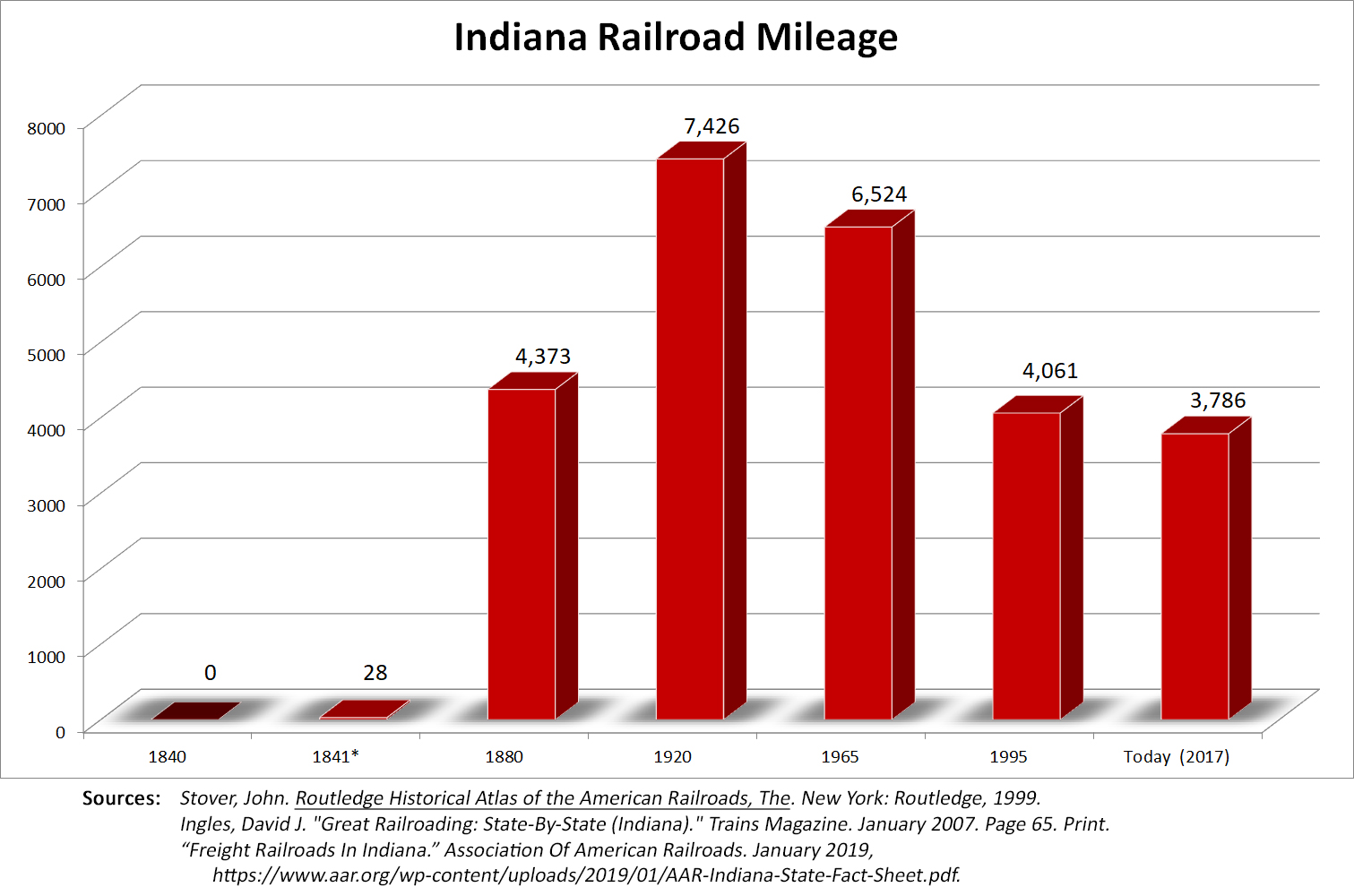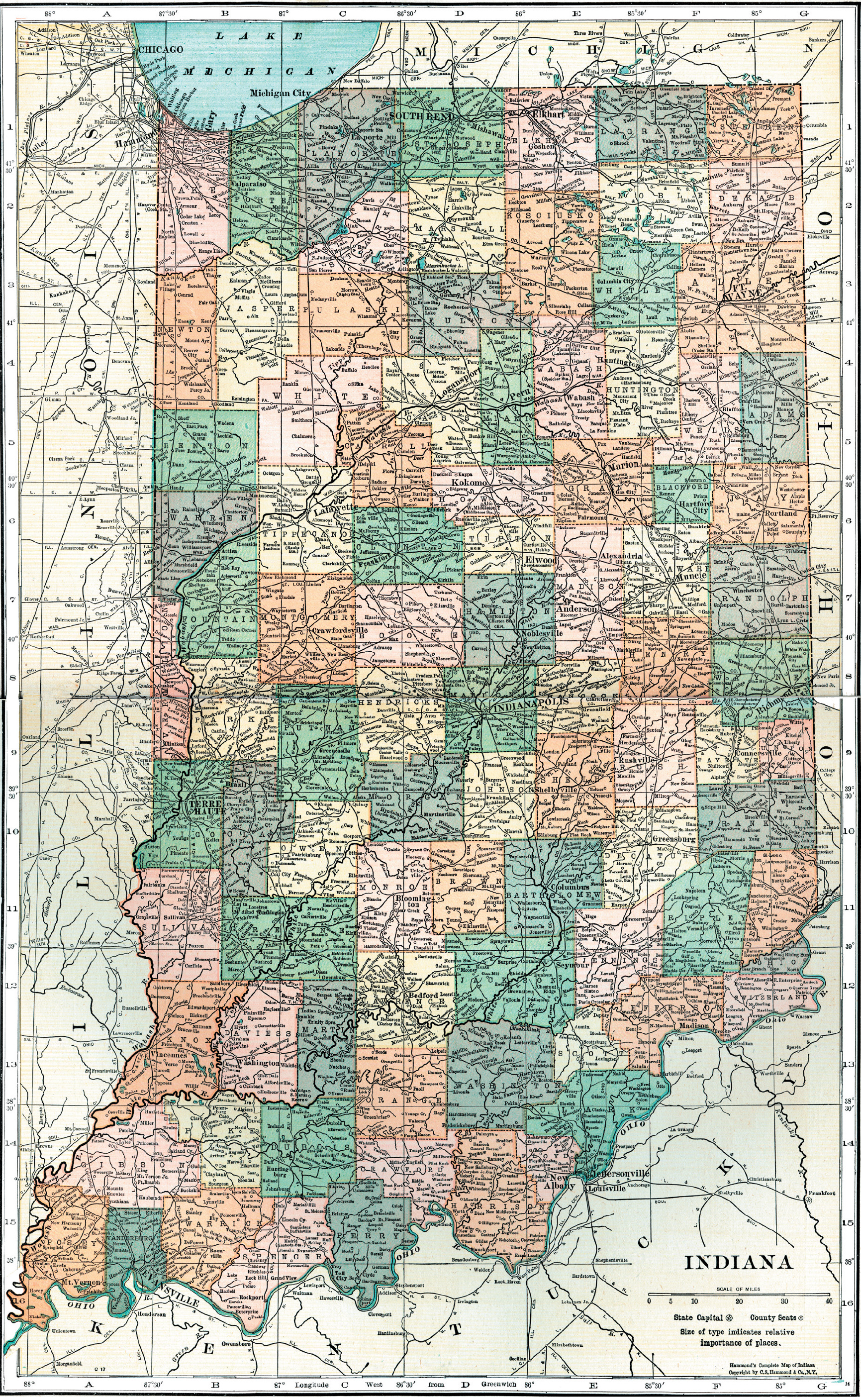- Home ›
- The States ›
- Indiana
Indiana Railroads: State Map, History, Abandoned Lines
Last revised: September 7, 2024
By: Adam Burns
Indiana railroads have a rich history dating back to the 1830s and
historically has not only been home to the important city of
Indianapolis but also a key through route to other important connections
like St. Louis (the third busiest gateway behind Chicago and Kansas
City) and Chicago.
Because the state was right next door to Illinois and near Chicago all of the major eastern trunk lines operated through it such as the B&O, PRR, New York Central, Erie, etc.
In this way, both states carry many similar characteristics. While Indiana may have featured 40% less mileage than its western neighbor it featured multiple trunk lines and many secondary branch lines.
The state has since lost 50% of its rail mileage including the Erie/Erie-Lackawanna and Baltimore & Ohio main lines (St. Louis, severed as a through route).
Today, Indiana is home to four of the seven Class I railroads and has numerous short lines, museums and tourist railroads operating within its borders.
Of note, for your interest there are a number of pages (from this website) listed here covering railroad subjects related to the state of Indiana such as museums, historic interurbans, stations/depots, etc.
Photos
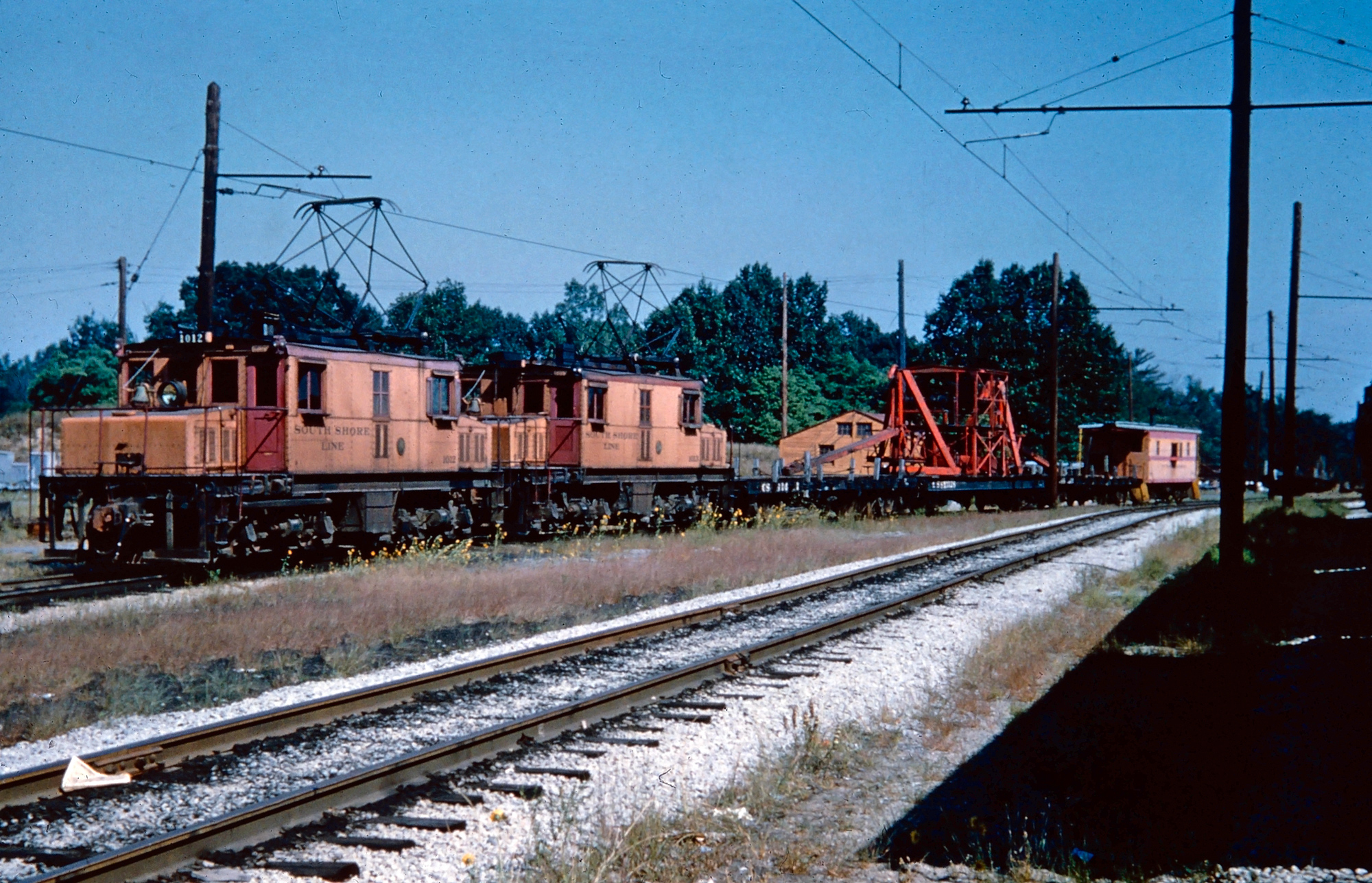 South Shore Line steeple-cab freight motors #1012 and #1013 have a work train at Michigan City, Indiana on September 11, 1960. American-Rails.com collection.
South Shore Line steeple-cab freight motors #1012 and #1013 have a work train at Michigan City, Indiana on September 11, 1960. American-Rails.com collection.History
The state's railroads date back to 1838 when the Madison, Indianapolis & Lafayette opened its original 15-mile main line from North Madison, Indiana.
The railroad later became part of the Jeffersonville, Madison & Indianapolis Railroad in 1866. The JM&I, itself, would become part of the Pittsburgh, Cincinnati, Chicago & St. Louis, a Pennsylvania Railroad subsidiary.
In any event, much like Illinois, Indiana had virtually no railroads prior to 1840 but this quickly changed by 1880 when the state boasted over 4,000 miles of trackage.
As with Illinois, Indiana was one of the few states that had both east-west main lines accessing Chicago and Indianapolis as well as north-south key routes (Louisville & Nashville Railroad and Illinois Central).
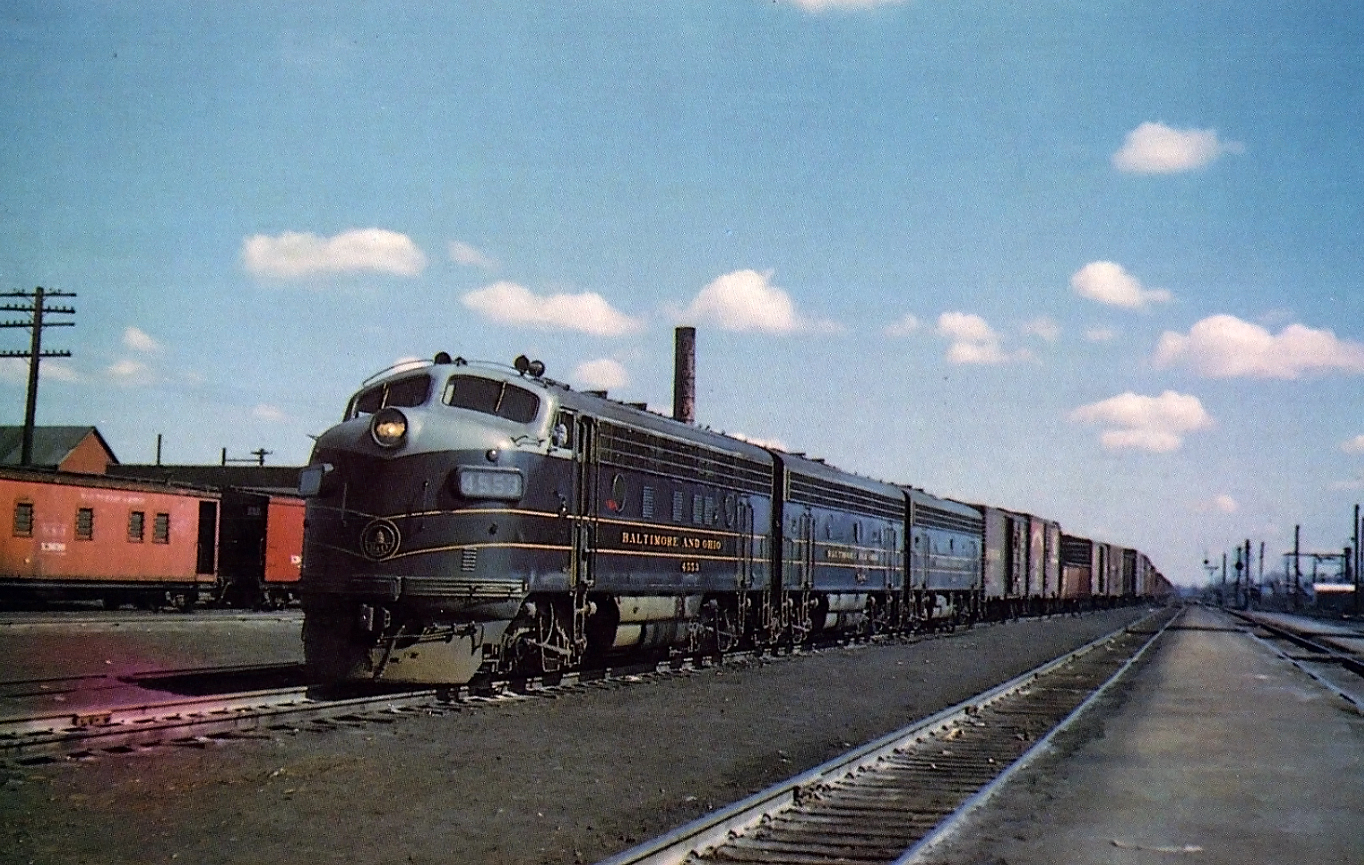 Baltimore & Ohio F7s lead a freight through Garrett, Indiana during March of 1958. Richard Wallin photo.
Baltimore & Ohio F7s lead a freight through Garrett, Indiana during March of 1958. Richard Wallin photo.Today, most of Indiana's rails are operated by four Class I railroads; CSX, Norfolk Southern, Canadian National Railway, and Canadian Pacific Railway.
The rest is operated by short lines and regionals some of which include:
- Indiana Rail Road
- Indiana & Ohio
- Chicago, Fort Wayne & Eastern Railroad
- Elkhart & Western Railroad;
- Evansville Western Railway
- Indiana Northeastern Railroad
- Indiana Southern Railroad
- Lake Michigan & Indiana Railroad
- Louisville & Indiana Railroad
- Louisville New Albany & Corydon Railroad
- Respondek Railroad
For a more in-depth look at Indiana's rail mileage throughout the years please refer to the chart below. As the chart depicts, the state was once home to nearly 7,500 miles of trackage.
Statistics
However, today that number has been cut down to just over 4,100 miles. With a decline of 45% since the 1920s this is about average considering most other state's have suffered similar loses.
State Mileage Chart
First Railroad
* Indiana's first railroad put into service was the Madison, Indianapolis & Lafayette, chartered in 1832 to link its namesake cities. Funding proved difficult but in 1841 a short 28-mile segment, from Madison to Queensville, had finally been completed, thanks, in part, to state intervention. Finally, in 1847 the entire route was opened. It later became part of the Pittsburgh, Cincinnati, Chicago & St. Louis, which later joined the Pennsylvania Railroad.
The Hoosier State's passenger trains are operated by Amtrak and include its tri-weekly Cardinal between Chicago and Washington, D.C. However, during the "Golden Years" several famous Eastern passenger trains passed through the state with important stops at Indianapolis.
State Map
Some of these trains include the Baltimore & Ohio's Capitol Limited and National Limited, PRR's Broadway Limited, C&O's George Washington, and New York Central's 20th Century Limited.
Abandoned Lines
Like Illinois, Indiana was once blanketed with railroads. It featured both eastern trunk lines bound for Chicago as well as southern roads, like the Southern Railway.
In addition, there were numerous secondary corridors and agricultural branch lines. In general, Indiana was serviced by the New York Central, Baltimore & Ohio, and Pennsylvania while the Monon was also a major player in its home state.
Sadly, Indiana has witnessed more main line/through route abandonments than in other state. The following corridors or railroads have been pulled up other the years:
- Erie/Erie Lackawanna's double-tracked, Chicago main line is gone entirely from the Ohio state line to the Windy City.
- Pennsylvania Railroad's "Panhandle" main line to St. Louis (Pittsburgh, Cincinnati, Chicago & St. Louis), another double-tracked route, is largely gone west of Columbus, Ohio.
- Chesapeake & Ohio's Chicago main line through Indiana (which it had achieved by acquiring the Chicago, Cincinnati & Louisville Railroad) was removed in the 1980's under the newly formed CSX Transportation.
- The Wabash main line through northern Indiana (4th District) to Gary.
- Much of the Monon network has been removed under successor Louisville & Nashville and CSX Transportation.
- Indiana's once-extensive network of electrified interurbans, totally 1,825 miles at its peak, is now gone. Notable was the Gary Railways, Union Traction Company Of Indiana (410 miles), and the Indiana Railroad System.
To learn more about these streamliners, and others, please click here. Aside from Amtrak's Cardinal, the historic interurban, the South Shore Line still serves Hammond and South Bend (which also connects with Chicago).
Even today, you can catch South Shore trains operating on street trackage, like in Michigan City!
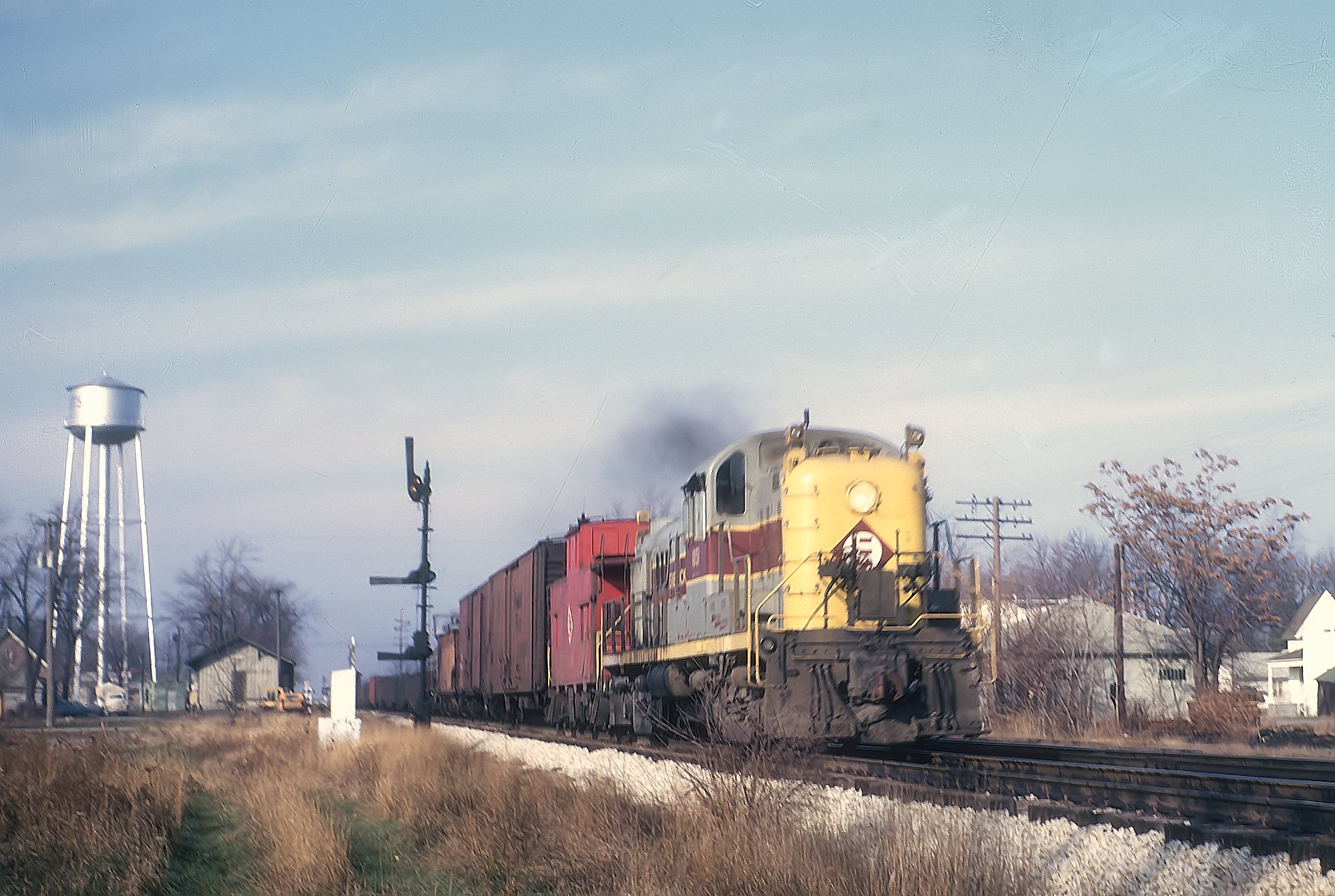 Erie Lackawanna RS3 #1051 appears to be working local service at Kouts, Indiana on November 27, 1966. The train is about to cross the PRR's "Panhandle" main line. Little remains of railroading in this small town today. Rick Burn photo.
Erie Lackawanna RS3 #1051 appears to be working local service at Kouts, Indiana on November 27, 1966. The train is about to cross the PRR's "Panhandle" main line. Little remains of railroading in this small town today. Rick Burn photo.Museums and Attractions
Indiana is also home to a number of railroad museums and tourist lines such as the:
- Indiana Railway Museum
- Indiana Transportation Museum
- Carthage, Knightstown & Shirley Railroad
- Fort Wayne Railroad Historical Society (home to operating Nickel Plate Road Berkshire #765),
- Hesston Steam Museum
- Hoosier Valley Railroad Museum
- Jefferson County Historical Society Museum and Railroad Depot
- Linden Railroad Museum
- National New York Central Railroad Museum
- Wabash Valley Railroaders Museum
- Whitewater Valley Railroad
In all, Indiana offers a wide variety of railroading from street running and interurbans to main line freight trains and Amtrak's Cardinal.
Even if you are a vacationer looking for something interesting to do the state offers a wide variety of railroad museums to choose from and visit.
In the end, you certainly should not be disappointed if you are heading to Indiana looking to catch railroads in action!
Recent Articles
-
Wisconsin's Wild West Train Rides
Feb 11, 26 10:54 PM
Through a unique blend of interactive entertainment and historical reverence, Wisconsin offers a captivating glimpse into the past with its Wild West train rides. -
Georgia's Wild West Train Rides
Feb 11, 26 10:44 PM
Nestled within its lush hills and historic towns, the Peach State offers unforgettable train rides that channel the spirit of the Wild West. -
North Carolina's Wild West Train Rides
Feb 11, 26 02:36 PM
North Carolina, a state known for its diverse landscapes ranging from serene beaches to majestic mountains, offers a unique blend of history and adventure through its Wild West train rides. -
South Carolina's Dinner Train Rides
Feb 11, 26 02:16 PM
There is only location in the Palmetto State offering a true dinner train experience can be found at the South Carolina Railroad Museum. Learn more here. -
Rhode Island's Dinner Train Rides
Feb 11, 26 02:08 PM
Despite its small size, Rhode Island is home to one popular dinner train experience where guests can enjoy the breathtaking views of Aquidneck Island. -
New York Tea Tasting Train Rides
Feb 11, 26 01:56 PM
Tea train rides provide not only a picturesque journey through some of New York's most scenic landscapes but also present travelers with a delightful opportunity to indulge in an assortment of teas. -
California Tea Tasting Train Rides
Feb 11, 26 01:37 PM
In California you can enjoy a quiet tea train experience aboard the Napa Valley Wine Train, which offers an afternoon tea service. -
Tennessee Tea Tasting Train Rides
Feb 11, 26 01:19 PM
If you’re looking for a Chattanooga outing that feels equal parts special occasion and time-travel, the Tennessee Valley Railroad Museum (TVRM) has a surprisingly elegant answer: The Homefront Tea Roo… -
Maine Ice Cream Tasting Train Rides
Feb 11, 26 11:58 AM
The Maine Narrow Gauge Railroad & Museum’s Ice Cream Train is a family-friendly Friday-night tradition that turns a short rail excursion into a small event. -
North Carolina Ice Cream Tasting Train Rides
Feb 11, 26 11:06 AM
One of the most popular warm-weather offerings at NCTM is the Ice Cream Train, a simple but brilliant concept: pair a relaxing ride with a classic summer treat. -
Pennsylvania "Wild West" Train Rides
Feb 10, 26 12:04 PM
The Keystone State is home to a variety of historical attractions, but few experiences can rival the excitement and nostalgia of a Wild West train ride. -
Ohio "Wild West" Train Rides
Feb 10, 26 11:34 AM
For those enamored with tales of the Old West, Ohio's railroad experiences offer a unique blend of history, adventure, and natural beauty. -
New York "Wild West" Train Rides
Feb 10, 26 11:23 AM
Join us as we explore wild west train rides in New York, bringing history to life and offering a memorable escape to another era. -
New Mexico Murder Mystery Train Rides
Feb 10, 26 11:12 AM
Among Sky Railway's most theatrical offerings is “A Murder Mystery,” a 2–2.5 hour immersive production that drops passengers into a stylized whodunit on the rails -
New York Ice Cream Tasting Train Rides
Feb 10, 26 10:09 AM
While CMRR runs several seasonal excursions, one of the most family-friendly (and, frankly, joyfully simple) offerings is its Ice Cream Express. -
Michigan Beer Tasting Train Rides
Feb 10, 26 10:02 AM
If you’re looking for a pure slice of autumn in West Michigan, the Coopersville & Marne Railway (C&M) has a themed excursion that fits the season perfectly: the Oktoberfest Express Train. -
Ohio Beer Tasting Train Rides
Feb 09, 26 10:07 PM
The Ohio Rail Experience's Quincy Sunset Tasting Train is a new offering that pairs an easygoing evening schedule with a signature scenic highlight: a high, dramatic crossing of the Quincy Bridge over… -
Texas Beer Tasting Train Rides
Feb 09, 26 02:07 PM
Texas State Railroad's “Pints In The Pines” train is one of the most enjoyable ways to experience the line: a vintage evening departure, craft beer samplings, and a catered dinner at the Rusk depot un… -
Michigan's ~ Murder Mystery ~ Dinner Train Rides
Feb 09, 26 01:47 PM
Among the lesser-known treasures of this state are the intriguing murder mystery dinner train rides—a perfect blend of suspense, dining, and scenic exploration. -
Virginia ~ Murder Mystery ~ Dinner Train Rides
Feb 09, 26 01:39 PM
Among the state's railroad attractions, murder mystery dinner trains stand out as a captivating fusion of theatrical entertainment, fine dining, and scenic travel. -
Florida Beer Tasting Train Rides
Feb 09, 26 01:25 PM
Among the Sugar Express's most popular “kick off the weekend” events is Sunset & Suds—an adults-focused, late-afternoon ride that blends countryside scenery with an onboard bar and a laid-back social… -
Illinois Beer Tasting Train Rides
Feb 09, 26 12:04 PM
Among IRM’s newer special events, Hops Aboard is designed for adults who want the museum’s moving-train atmosphere paired with a curated craft beer experience. -
Tennessee Whiskey Tasting Train Rides
Feb 08, 26 10:46 AM
Here’s what to know, who to watch, and how to plan an unforgettable rail-and-whiskey experience in the Volunteer State. -
Wisconsin Beer Tasting Train Rides
Feb 08, 26 10:35 AM
The East Troy Railroad Museum's Beer Tasting Train, a 2½-hour evening ride designed to blend scenic travel with guided sampling. -
California Beer Tasting Train Rides
Feb 08, 26 10:33 AM
While the Niles Canyon Railway is known for family-friendly weekend excursions and seasonal classics, one of its most popular grown-up offerings is Beer on the Rails. -
Colorado BBQ Tasting Train Rides
Feb 08, 26 10:32 AM
One of the most popular ways to ride the Leadville Railroad is during a special event—especially the Devil’s Tail BBQ Special, an evening dinner train that pairs golden-hour mountain vistas with a hea… -
New Jersey Beer Tasting Train Rides
Feb 07, 26 11:23 AM
On select dates, the Woodstown Central Railroad pairs its scenery with one of South Jersey’s most enjoyable grown-up itineraries: the Brew to Brew Train. -
Minnesota Beer Tasting Train Rides
Feb 07, 26 11:21 AM
Among the North Shore Scenic Railroad's special events, one consistently rises to the top for adults looking for a lively night out: the Beer Tasting Train, -
New Mexico Beer Tasting Train Rides
Feb 07, 26 11:18 AM
Sky Railway's New Mexico Ale Trail Train is the headliner: a 21+ excursion that pairs local brewery pours with a relaxed ride on the historic Santa Fe–Lamy line. -
Michigan Whiskey Tasting Train Rides
Feb 07, 26 11:13 AM
There's a unique thrill in combining the romance of train travel with the rich, warming flavors of expertly crafted whiskeys. -
Oregon Beer Tasting Train Rides
Feb 07, 26 10:08 AM
If your idea of a perfect night out involves craft beer, scenery, and the gentle rhythm of jointed rail, Santiam Excursion Trains delivers a refreshingly different kind of “brew tour.” -
Arizona Beer Tasting Train Rides
Feb 07, 26 09:22 AM
Verde Canyon Railroad’s signature fall celebration—Ales On Rails—adds an Oktoberfest-style craft beer festival at the depot before you ever step aboard. -
Pennsylvania Ice Cream Tasting Train Rides
Feb 06, 26 05:19 PM
And among Everett’s most family-friendly offerings, none is more simple-and-satisfying than the Ice Cream Special—a two-hour, round-trip ride with a mid-journey stop for a cold treat in the charming t… -
New York Beer Tasting Train Rides
Feb 06, 26 12:12 PM
Among the Adirondack Railroad's most popular special outings is the Beer & Wine Train Series, an adult-oriented excursion built around the simple pleasures of rail travel. -
Massachusetts Beer Tasting Train Rides
Feb 06, 26 12:09 PM
Among Cape Cod Central's lineup of specialty trips, the railroad’s Rails & Ales Beer Tasting Train stands out as a “best of both worlds” event. -
Pennsylvania Beer Tasting Train Rides
Feb 06, 26 12:02 PM
Today, EBT’s rebirth has introduced a growing lineup of experiences, and one of the most enticing for adult visitors is the Broad Top Brews Train. -
New York Whiskey Tasting Train Rides
Feb 06, 26 11:56 AM
For those keen on embarking on such an adventure, the Arcade & Attica offers a unique whiskey tasting train at the end of each summer! -
Florida Whiskey Tasting Train Rides
Feb 06, 26 11:51 AM
If you’re dreaming of a whiskey-forward journey by rail in the Sunshine State, here’s what’s available now, what to watch for next, and how to craft a memorable experience of your own. -
Kentucky Whiskey Tasting Train Rides
Feb 06, 26 11:49 AM
Whether you’re a curious sipper planning your first bourbon getaway or a seasoned enthusiast seeking a fresh angle on the Kentucky Bourbon Trail, a train excursion offers a slow, scenic, and flavor-fo… -
Indiana Ice Cream Tasting Train Rides
Feb 06, 26 10:18 AM
The Indiana Rail Experience's "Indiana Ice Cream Train" is designed for everyone—families with young kids, casual visitors in town for the lake, and even adults who just want an hour away from screens… -
Maryland Ice Cream Tasting Train Rides
Feb 05, 26 10:07 PM
Among WMSR's shorter outings, one event punches well above its “simple fun” weight class: the Ice Cream Train. -
North Carolina Beer Tasting Train Rides
Feb 05, 26 01:28 PM
If you’re looking for the most “Bryson City” way to combine railroading and local flavor, the Smoky Mountain Beer Run is the one to circle on the calendar. -
Indiana Beer Tasting Train Rides
Feb 05, 26 11:26 AM
On select dates, the French Lick Scenic Railway adds a social twist with its popular Beer Tasting Train—a 21+ evening built around craft pours, rail ambience, and views you can’t get from the highway. -
Ohio Whiskey Tasting Train Rides
Feb 05, 26 10:36 AM
LM&M's Bourbon Train stands out as one of the most distinctive ways to enjoy a relaxing evening out in southwest Ohio: a scenic heritage train ride paired with curated bourbon samples and onboard refr… -
North Carolina Whiskey Tasting Train Rides
Feb 05, 26 10:34 AM
One of the GSMR's most distinctive special events is Spirits on the Rail, a bourbon-focused dining experience built around curated drinks and a chef-prepared multi-course meal. -
Virginia Ale Tasting Train Rides
Feb 05, 26 10:30 AM
Among Virginia Scenic Railway's lineup, Ales & Rails stands out as a fan-favorite for travelers who want the gentle rhythm of the rails paired with guided beer tastings, brewery stories, and snacks de… -
Colorado St. Patrick's Day Train Rides
Feb 04, 26 01:52 PM
Once a year, the D&SNG leans into pure fun with a St. Patrick’s Day themed run: the Shamrock Express—a festive, green-trimmed excuse to ride into the San Juan backcountry with Guinness and Celtic tune… -
Utah St. Patrick's Day Train Rides
Feb 04, 26 12:19 PM
When March rolls around, the Heber Valley adds an extra splash of color (green, naturally) with one of its most playful evenings of the season: the St. Paddy’s Train. -
Washington Whiskey Tasting Train Rides
Feb 04, 26 10:28 AM
Climb aboard the Mt. Rainier Scenic Railroad for a whiskey tasting adventure by train! -
Connecticut Whiskey Tasting Train Rides
Feb 04, 26 10:11 AM
While the Naugatuck Railroad runs a variety of trips throughout the year, one event has quickly become a “circle it on the calendar” outing for fans of great food and spirited tastings: the BBQ & Bour…

